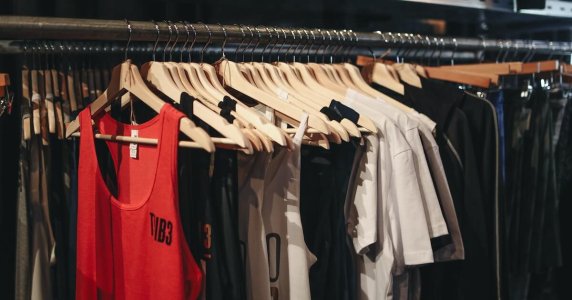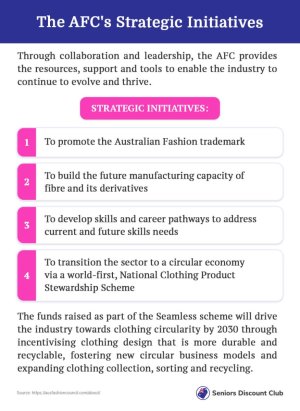BIG W and David Jones lead the charge against waste – But will the rest of the fashion industry follow?
- Replies 9
When it comes to sustainability, our planet has been experiencing a crisis in recent years, and fashion is just one of the industries contributing to environmental harm.
And while we know some people love discovering new fashion finds, it’s getting difficult to ignore the 200,000 tonnes of unwanted clothes ending up in landfills across Australia every year due to fast fashion.
Luckily, a new voluntary scheme called Seamless has just been announced, aiming to tackle the fashion industry's ever-growing waste problem.
The initiative is led by the industry’s peak body, the Australian Fashion Council (AFC), and is set to raise $36 million each year and vastly improve the fashion industry's sustainability practices.
The AFC received $1 million from the previous federal government to set up the scheme.
But unfortunately, not all of our favourite clothing retailers are on board.
According to the AFC, their team directly approached 30 major brands to be founding members, but only six have signed up, namely: BIG W, David Jones, Lorna Jane, Rip Curl, RM Williams and The Iconic.
By joining this cause, the participating brands voluntarily impose a levy of 4 cents per garment on their sales, putting the collected funds towards various sustainability initiatives such as eco-friendly design, resale of used items, and textile recycling.
Despite their best efforts, the AFC admits that in order to reach their yearly fundraising goal of $36 million, they still need 60 per cent of the market to hop on board, which is miles away from their current following.
In a recent speech, Environment Minister Tanya Plibersek had a message for the reluctant fashion industry: Sign up within 12 months or face regulations directly.
‘That is a drop-dead date. No excuses, no extensions. I will impose a system, and I will set the levy,’ she stated.
Seamless is being implemented under the Federal Product Stewardship Act, which sees waste-stream management imposed on industries through voluntary, co-regulatory or mandatory schemes.
According to the Department of Climate Change, Energy, the Environment and Water, ‘Clothing can pollute the environment through the release of hazardous chemicals, from the microfibres from laundering and the placing of synthetic clothing in landfill’.
‘The Australian Fashion Council is leading a consortium designing and developing a product stewardship scheme for clothing textiles,’ it continued.
Other items being targeted under this scheme include batteries, solar panels, baby car seats, mattresses and e-waste.
If the scheme reaches its target, the AFC predicts that 60 per cent of old clothing will be saved from landfills by 2027.
But the impact goes beyond reducing textile waste—the fashion industry is a significant contributor to environmental pollution and climate change on a global level.
In fact, a 2019 UK Government report revealed that textile production was responsible for ‘climate change [more] than international aviation and shipping combined’ while consuming vast amounts of fresh water and producing chemical and plastic pollution.
‘Synthetic fibres are being found in the deep sea, in the Arctic Sea ice, fish and shellfish,’ it said.
‘The way we make, use and throw away our clothes is unsustainable.’
Monash Sustainable Development Institute's fashion sustainability expert Aleasha McCallion said that in Australia, the industry’s impact is wide-ranging.
‘We are directly supporting the fossil fuel industry by supporting things like polyester,’ she said.
‘It is environmentally extremely costly.’
The bottom line? The call to action is loud and clear: it's time for all fashion retailers to join the fight against waste.
 Our members, what do you think about the efforts being taken by these brands? Let us know in the comments!
Our members, what do you think about the efforts being taken by these brands? Let us know in the comments!
And while we know some people love discovering new fashion finds, it’s getting difficult to ignore the 200,000 tonnes of unwanted clothes ending up in landfills across Australia every year due to fast fashion.
Luckily, a new voluntary scheme called Seamless has just been announced, aiming to tackle the fashion industry's ever-growing waste problem.
The initiative is led by the industry’s peak body, the Australian Fashion Council (AFC), and is set to raise $36 million each year and vastly improve the fashion industry's sustainability practices.
The AFC received $1 million from the previous federal government to set up the scheme.
But unfortunately, not all of our favourite clothing retailers are on board.
According to the AFC, their team directly approached 30 major brands to be founding members, but only six have signed up, namely: BIG W, David Jones, Lorna Jane, Rip Curl, RM Williams and The Iconic.
By joining this cause, the participating brands voluntarily impose a levy of 4 cents per garment on their sales, putting the collected funds towards various sustainability initiatives such as eco-friendly design, resale of used items, and textile recycling.
Despite their best efforts, the AFC admits that in order to reach their yearly fundraising goal of $36 million, they still need 60 per cent of the market to hop on board, which is miles away from their current following.
In a recent speech, Environment Minister Tanya Plibersek had a message for the reluctant fashion industry: Sign up within 12 months or face regulations directly.
‘That is a drop-dead date. No excuses, no extensions. I will impose a system, and I will set the levy,’ she stated.
Seamless is being implemented under the Federal Product Stewardship Act, which sees waste-stream management imposed on industries through voluntary, co-regulatory or mandatory schemes.
According to the Department of Climate Change, Energy, the Environment and Water, ‘Clothing can pollute the environment through the release of hazardous chemicals, from the microfibres from laundering and the placing of synthetic clothing in landfill’.
‘The Australian Fashion Council is leading a consortium designing and developing a product stewardship scheme for clothing textiles,’ it continued.
Other items being targeted under this scheme include batteries, solar panels, baby car seats, mattresses and e-waste.
If the scheme reaches its target, the AFC predicts that 60 per cent of old clothing will be saved from landfills by 2027.
But the impact goes beyond reducing textile waste—the fashion industry is a significant contributor to environmental pollution and climate change on a global level.
In fact, a 2019 UK Government report revealed that textile production was responsible for ‘climate change [more] than international aviation and shipping combined’ while consuming vast amounts of fresh water and producing chemical and plastic pollution.
‘Synthetic fibres are being found in the deep sea, in the Arctic Sea ice, fish and shellfish,’ it said.
‘The way we make, use and throw away our clothes is unsustainable.’
Monash Sustainable Development Institute's fashion sustainability expert Aleasha McCallion said that in Australia, the industry’s impact is wide-ranging.
‘We are directly supporting the fossil fuel industry by supporting things like polyester,’ she said.
‘It is environmentally extremely costly.’
The bottom line? The call to action is loud and clear: it's time for all fashion retailers to join the fight against waste.
Key Takeaways
- The scheme aims to raise $36 million each year to improve Australia's fashion industry's sustainability through a 4-cent per garment levy on signatories' sales.
- Of 30 major Australian brands approached to be founding members of the scheme, only six have signed up: BIG W, David Jones, Lorna Jane, Rip Curl, RM Williams, and The Iconic.
- The scheme hopes to divert 60 per cent of old clothing away from landfill by 2027, with Environment Minister Tanya Plibersek warning of regulation if more brands do not sign up in the next 12 months.
- Australia's fashion industry is under increasing scrutiny for its environmental impact, with an estimated 200,000 tonnes of clothing ending up in landfill each year.










